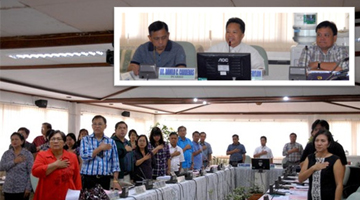 Los Baños, Laguna ─ Directors of the 14 regional R&D (research and development) consortia recently converged at the PCARRD Headquarters for the Fourth National Consortium Directors Meeting. The meeting was conducted to lay out regional S&T (science and technology) plans for 2011 and focus on doable but highly effective programs.
Los Baños, Laguna ─ Directors of the 14 regional R&D (research and development) consortia recently converged at the PCARRD Headquarters for the Fourth National Consortium Directors Meeting. The meeting was conducted to lay out regional S&T (science and technology) plans for 2011 and focus on doable but highly effective programs.
Setting the tone for the meeting, PCARRD Executive Director Patricio S. Faylon called on the directors to “honestly take stock of what can really be done with our meager resources”. Thus, talks centered on the consortia's work and financial plans for 2011 and their respective focus commodities for the regional S&T agenda (STA) 2011─2016.
The presentation of the regional plans and STA offered an opportunity for the Council and its partners to rationalize programs and set a common direction for 2011─2016. It also triggered dialogue on new ways to ensure relevance in the midst of changing times.
Faylon furthered that as the situation in the AFNR (agriculture, forestry and natural resources) sectors becomes highly variable, the Council and its partners must be able to respond effectively. As such, he enlisted the consortium directors’ assistance in the Council’s campaign for continual improvement.
“Together, we shall implement the regional S&T programs. We shall ensure that our programs are focused but still effective”. These moves consequently, will ensure that government investments in the AFNR sectors are used well and used properly.
In keeping with the overall theme of responding to the variable AFNR environment, Council representatives and the consortium directors reviewed the regional STAs.
In effect, the STA will guide PCARRD’s investments in the regions and ensure that programs with great potential impact will be supported. The agendas will also ensure that the regions will participate in programs for which they have the resources to bring into play.
Central to the performance of the various regions in the implementation of their STA are the regional consortium and how it operates. The body agreed that consortium operations must adjust to changes in the AFNR setting as well.
The consortium directors will meet again in July as part of the ongoing initiative to improve consortium operations.
